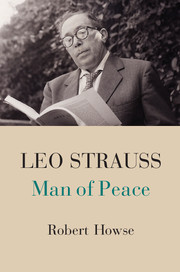Book contents
- Frontmatter
- Dedication
- Contents
- Preface and Acknowledgments
- 1 Introduction
- 2 Warrior Morality and the Fate of Civilization
- 3 Legitimacy and Legality, Thinking and Ruling in the Closed Society and the World State
- 4 Strauss’s Machiavelli
- 5 Thucydides versus Machiavelli
- 6 Justice and Progress
- 7 Conclusion
- Abbreviations
- Index
- References
6 - Justice and Progress
Strauss’s Assessment of Modern International Law
Published online by Cambridge University Press: 05 September 2014
- Frontmatter
- Dedication
- Contents
- Preface and Acknowledgments
- 1 Introduction
- 2 Warrior Morality and the Fate of Civilization
- 3 Legitimacy and Legality, Thinking and Ruling in the Closed Society and the World State
- 4 Strauss’s Machiavelli
- 5 Thucydides versus Machiavelli
- 6 Justice and Progress
- 7 Conclusion
- Abbreviations
- Index
- References
Summary
Introduction
In the previous chapter, we noted Strauss’s insistence on the importance of international law to civilization. How is this to be reconciled with his sometimes-hostile (and better-known) remarks concerning modern projects of international law, especially world peace through law? Steven Smith, one of the most careful interpreters of Strauss, writes, “A softer version of [Kojève’s cosmopolitanism] has been held by Wilsonian idealists as well as contemporary European social democrats who have relaxed the demand for a world state and would be content with a global federation of all existing and emergent states under the auspices of a fortified UN and international courts of justice. Strauss was deeply resistant to this kind of cosmopolitanism or global citizenship, whose ultimate end is the withering away of the sovereign state” (LSPPJ, p. 192).
Yet does not the moral and political outlook of humanity that is attributed by Strauss to Thucydides animate in part the UN project of a cosmopolitan right that works within the overall reality of a world of sovereign states pursuing their interests? As noted in Chapter 3, Strauss understood some projects of integration through law, notably the European Community, to be consistent with the preservation of meaningful elements of sovereignty. Thus, one may doubt whether Smith is right to imply that Strauss understood all efforts in the direction of transnational political integration as having the aim of withering away the state.
- Type
- Chapter
- Information
- Leo StraussMan of Peace, pp. 149 - 172Publisher: Cambridge University PressPrint publication year: 2014



